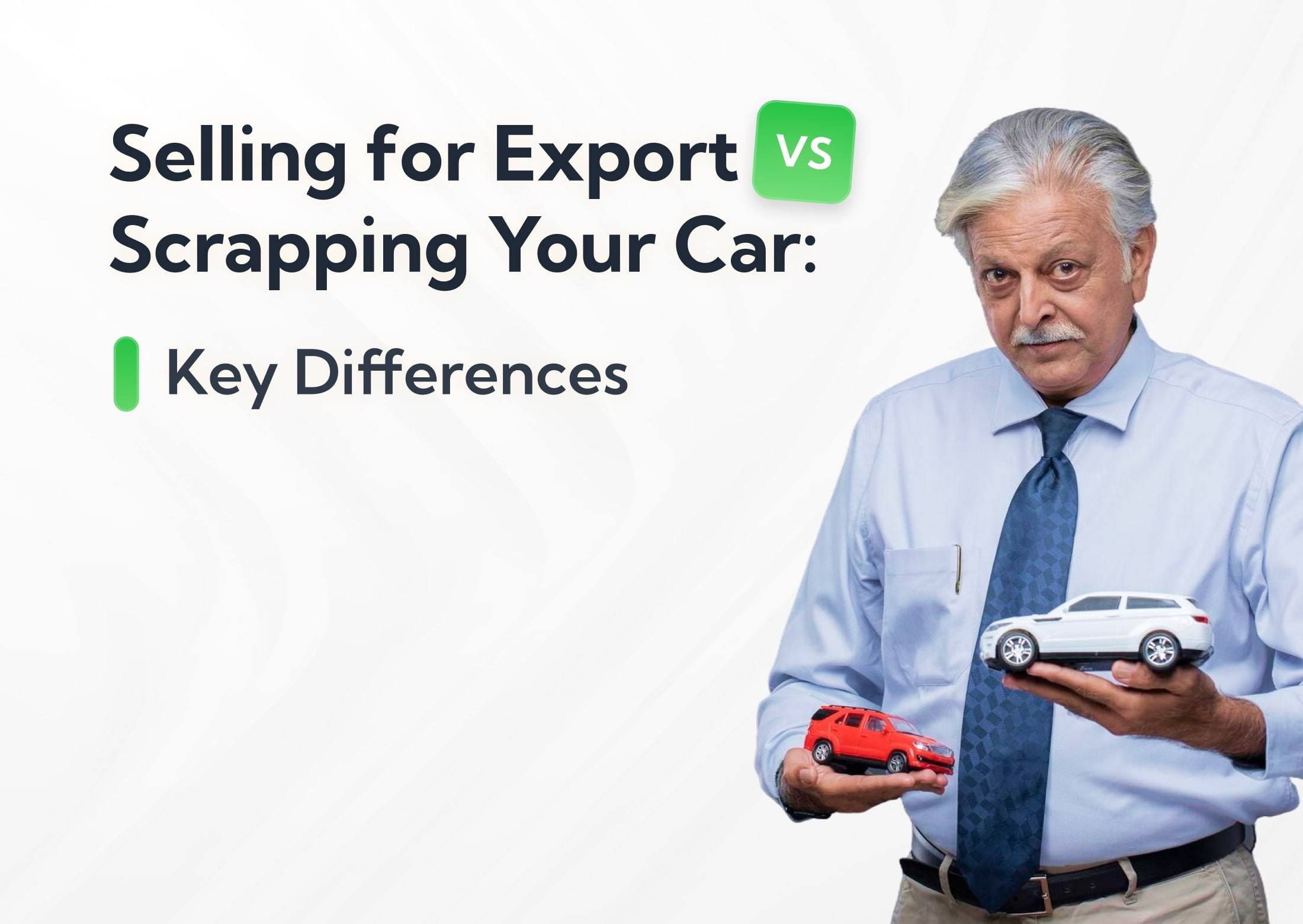Selling for Export vs Scrapping Your Car: Key Differences
Thinking of getting rid of your old car? Selling it for export might earn you more than scrapping, but only if it’s the right type of vehicle. This guide breaks down the pros, cons, legal steps and key differences of scrapping your car vs selling for export so you can make the smartest choice with zero guesswork.
Last updated: 5th February, 2026

Award-winning CEO driving growth and social impact across automotive, recycling, and technology-led enterprise platforms.

Listen to this story
When your car’s time on UK roads is up, you’ve got a decision to make. Do you sell it to an exporter? Or do you send it to the scrap yard and call it a day?
Both options an make sense depending on the condition of the car, the paperwork you’ve got and how much effort you’re willing to put in. Selling to an exporter could land you a bit of extra cash. Scrapping is faster, easier and almost completely hands-off.
Today’s guide breaks it all down so you can make the right call for your situation, whether you're clearing space on the driveway or getting rid of a non-runner that’s reached the end of its life.
What's in this article
- 4. Financial differences between exporting and scrapping a vehicle
- 4.1 When export prices exceed scrap value
- 4.2 Cars that sell better overseas than in the UK
- 4.3 Costs of transport and export administration
- 4.4 Predictability of scrap prices vs uncertainty in export markets
- 4.5 Best practices for choosing between export and scrap
- 4.6 Assessing vehicle age, condition and market demand
- 4.7 Getting multiple quotes for scrap and export
- 4.8 Using licensed dealers and ATFs only
- 4.9 Avoiding scams in export and scrap transactions
- 5. Final words
Overview of selling vs scrapping options
When you’re done with a car, you’ve got several routes to take, especially if it’s still running.
If you're selling, your options include:
- Private sale: List it on Auto Trader, Facebook Marketplace, or Gumtree and deal with buyers directly.
- Part exchange: Trade it in when buying another car from a dealer.
- Car-buying services: Sell it to companies like We Buy Any Car or Motorway.
- Selling to a garage or trader: Offload it to someone in the motor trade.
- Auction: Get buyers to place bids on the car through an online or in-person vehicle auction.
- Export sale: Sell to someone who wants the car shipped abroad, often for parts or use in another country.
If you're scrapping, your options are more straightforward. You can either (a) scrap through a licensed ATF (Authorised Treatment Facility), (b) break it for parts yourself or (c) sell to a breaker. B is only possible if you have proper licensing, making A and C the only viable choices.
For the purposes of this article, we’re focusing on these two end-of-life options: selling your car to an exporter and scrapping your car through a licensed ATF.
Selling a car for export
When you sell your car for export, what you’re really doing is selling it to a dealer or export agent who intends to ship it out of the UK to a country where used UK vehicles are in high demand. These buyers handle the logistics, paperwork and shipping themselves.
Why are UK car exports in demand?
Used UK cars are popular overseas for a few reasons:
- Many countries drive on the left, so right-hand drive vehicles are sought after.
- Older petrol and diesel engines, which face stricter rules here, are still usable abroad.
- The UK’s MOT system means cars are well-maintained compared to other markets.
- Certain makes and models are cheaper to buy in the UK than locally elsewhere.
- Lower-income countries depend on older models from the UK because newer ones are too expensive for local purchasing power.
Who buys second-hand cars from the UK?
Common export destinations include Africa (primarily Kenya, Uganda, Ghana and Nigeria), former British colonies in the Caribbean (including Jamaica and Trinidad and Tobago) and right-hand drive nations like Cyprus, Malta, Pakistan, India and Sri Lanka. For example, the African continent imports 90% of its used cars from Europe, which includes the UK.
How to formally notify the DVLA when selling to an exporter
If your car’s being permanently exported, you’ll need to notify the DVLA by filling in the “permanent export” section. You’ll detach this section and leave the rest of the logbook with the buyer.
You’ll also need to:
- Give the full name and address of the buyer (or export company) abroad
- Send that section to the DVLA, Swansea, SA99 1BD
- Keep a copy for your records
- Give the rest of the logbook to the buyer, unless they ask for the whole thing
Some exporters may also ask for a Bill of Sale or receipt, especially if they’re arranging transport on your behalf.
Note: Most methods for getting rid of your car have an online option and/or it’s possible without a V5C. When you’re exporting a vehicle, you MUST have the V5C and you can ONLY notify the DVLA by post.
Scrapping a car in the UK
Scrapping a car is the process of permanently disposing of it through a licensed facility that breaks it down for parts and recycles the metal. You’ll get a fixed price based on the car’s weight and reusable components, and it’ll be collected from your home or wherever it’s parked.
Using an Authorised Treatment Facility (ATF)
By law, only an ATF (Authorised Treatment Facility) can scrap a vehicle in the UK. These are government-licensed sites that meet strict environmental standards for safely dismantling, recycling and disposing of end-of-life vehicles. You can arrange scrappage directly (time-consuming) or use our online platform, which instantly connects you with local ATFs.
Legal requirement for a Certificate of Destruction (CoD)
Once the car is scrapped, the ATF must issue a Certificate of Destruction (CoD). This is your legal proof that the vehicle has been dismantled and is no longer your responsibility. Without a CoD, you could still be liable for road tax, penalties and parking fines even after the car is gone.
What the experts say

Steven Jackson OBE
Scrap value based on metal and parts recycling
The final price you’re paid at a scrap yard is typically based on:
- The car’s weight in metal
- Current scrap metal market rates
- Presence of resellable parts like alloy wheels, catalytic converters or a working engine
Heavier cars and those with reusable components fetch more. But unlike selling for export, the value is fixed and, for the most part, non-negotiable.
Environmental and legal compliance in scrapping
Scrapping through an ATF ensures your vehicle is handled responsibly. Fluids are drained, hazardous materials are removed and up to 95% of the vehicle is recycled to meet UK and EU environmental standards.
It’s also the safest option legally. Using an unlicensed yard or “cash for cars” operation leaves you open to fines, vehicle misuse and in the worst cases, criminal liability. Plus, there’s no legal recourse or buyer protection on your end.
Financial differences between exporting and scrapping a vehicle
In most cases, selling your car for export will get you more money than scrapping it. Sometimes significantly more. Scrapping, on the other hand, offers a faster payout but usually at a lower fixed rate based on weight and parts value.
When export prices exceed scrap value
Exporters often pay above scrap value for vehicles that still run or can be easily and cheaply repaired. Even high-mileage or MOT-failed cars still have life left in them in a different country with cheap local labour and parts and fewer (if any) environmental and safety regulations.
In those cases, the car’s utility value overseas outweighs its scrap metal value here.
Cars that sell better overseas than in the UK
The UK might be a relatively small island, but it’s home to car models that enjoy massive global demand. In fact, of the nearly 780,000 cars produced in the UK in 2024, eight in 10 were exported, primarily to the EU, US and China.
The UK was also one of the top six vehicle exporters to the US in 2024, thanks in large part to its luxury and performance brands.
Some of the UK’s best-known exports include:
- Mini Cooper models
- Jaguar and Land Rover vehicles (JLR sold roughly 94,000 cars in the US alone in 2024, about a quarter of their global total)
- Rolls‑Royce, Aston Martin, Bentley and McLaren — brands that hold premium value in overseas markets
But even on the second-hand market, there are plenty of models that fetch higher prices abroad than they do here in the UK.
As for in-demand models that sell on the secondary market (which is what you're concerned with right now), a few examples include:
- Japanese 4x4s like Toyota Land Cruisers and Hilux models
- Diesel saloons and hatchbacks with working engines
- Older right-hand drive vehicles that are still compliant in importing countries
- Cars that are banned or taxed heavily in UK cities but still legal elsewhere
- Models from reliable and ubiquitous brands like VW and Renault
Costs of transport and export administration
While exporters typically cover shipping and paperwork, they’ll deduct costs from your offer or give you a slightly lower price to offset them.
These include:
- Transport to port
- Container space or RoRo shipping
- Customs and clearance paperwork
You won’t need to handle these yourself, but it’s worth understanding what’s built into the offer you’re getting.
Predictability of scrap prices vs uncertainty in export markets
Scrap prices are stable and easy to check. They’re based on metal markets, part values and car weight and our algorithm can calculate the total scrap value of your car (parts included) in less than 30 seconds.
Export, however, is less predictable.
Your offer depends on:
- Global demand for your make/model
- Import regulations in destination countries
- Exchange rates and shipping costs
Some days, your car might be in high demand. And then the next, that same car might be worth little more than scrap.
Best practices for choosing between export and scrap
Export is better when your car is still running (or close to it), has demand overseas and you’re willing to wait a little longer for a higher payout. Scrap is better if the car’s beyond economical repair, missing key parts or you just want a fast, hassle-free way to get rid of it legally.
Assessing vehicle age, condition and market demand
Out of the more than 130,000 cars we've scrapped, the most common age is 18 years. Almost all vehicles fall into the 16-to-20-year range. The reason is simple: by that point, the resale value has dropped so low that even a minor fault or small accident can write the car off. It’s just not worth repairing.
We rarely see newer models because they’re usually still running, still valuable and more likely to find a buyer either in the UK or overseas. Export buyers in particular are on the lookout for 10-to-15-year-old cars that might not pass emissions or ULEZ rules here, but are still perfectly usable abroad.
Getting multiple quotes for scrap and export
Don’t just take the first offer you get. The difference between quotes can be huge, especially when comparing export and scrap. And it’s also about transparency, not just price. A quote is only useful if you know what’s being factored in.
When you get a quote through us, we go further than most. We calculate not just the metal weight, but also the potential value of resellable parts, something most online platforms ignore. And you’ll receive a detailed video quote breaking down exactly how we arrived at the figure.
Even if you’re not going to scrap your car, using our quote as a starting point puts you in the strongest position to make the right decision.
Using licensed dealers and ATFs only
If you scrap your car through a non-ATF yard or unlicensed trader, you risk:
- Not receiving a Certificate of Destruction (which means you’re still legally responsible)
- Not getting your road tax refund
- Having the car sold on or used illegally
- Fines, tax issues and liability for future offences
This is one area where scrapping your car online makes it safer. When you use our platform, you're only ever dealing with fully licensed ATFs, so you can be 100% confident your car will be recycled responsibly and by the book.
Avoiding scams in export and scrap transactions
Unfortunately, the scrap and export world isn't scam-proof and dodgy buyers know the average driver isn’t well-versed in the motor trade.
Some common scrap car scams include:
- Fake dealers posing as licensed ATFs
- Unlicensed yards offering illegal cash-in-hand payments
- Promised prices suddenly dropping once the driver arrives
- Buyers who take the car and resell it illegally instead of scrapping
And export scams can be just as risky:
- Buyers promising a bank transfer after collection that never comes
- People asking for your logbook (V5C) without payment
- Exporters who ship the car and leave you to deal with DVLA paperwork, causing all sorts of legal headaches down the line
The safest way to avoid scams? Use a trusted platform that verifies all buyers and handlers. Or in the case of exporting, go with a verified and reputable buyer who has public reviews.
Final words
If your car still runs (or it nearly does) and it’s the kind of model that holds value overseas, export will probably net you more. But if it’s old, failed its MOT or isn’t financially worth repairing, scrapping it through a licensed ATF is by far the quickest and cleanest route.
Either way, get multiple quotes, deal only with trusted buyers and make sure all the paperwork is done properly. That’s the difference between a smooth process and a mess that comes back to bite you later.
Frequently asked questions
Yes, you’re required to notify the DVLA if you're permanently exporting your car out of the UK. Fill in the “permanent export” section and post it to DVLA, Swansea, SA99 1BD. If you don’t have the full logbook, you’ll need to apply for a new one online using form V62. It costs £25 and takes up to 5 working days to process.
To export a car from the UK legally, you’ll need the V5C logbook. It proves you’re the registered keeper and contains the section you’ll use to notify the DVLA of permanent export. You’ll also need a bill of sale (a simple receipt) showing who you sold the car to and when.
It depends. If your car still runs or is just a minor repair away, you’ll almost always get more by selling it for export. Export buyers pay above scrap value for vehicles they can still use or sell abroad.
But if it’s an older model that’s failed its MOT, doesn’t start or isn’t worth fixing, then scrapping is the better (and faster) option.
If you permanently export your car, you're entitled to a road tax refund for any full months remaining on the tax. Once you notify the DVLA of the export using your V5C, they’ll automatically cancel the tax and issue a refund by cheque to the name and address on file. Just make sure the DVLA gets the notification.
Dealers, without question. Reputable export dealers will have a motor trade licence, a registered business and a track record you can verify. They know the process, handle the paperwork properly and are far less likely to disappear after collection.
Private buyers, on the other hand, can be hit or miss, so you’re taking on more risk if something goes wrong later.
It mostly depends on the destination country. If you're exporting to the EU, the car will need to meet stricter emissions, safety and registration standards, which limits what can be shipped over.
But if you're selling to countries in Africa, South Asia, or the Caribbean, the rules are generally more relaxed. That means older models, diesels and MOT-failed cars are still accepted and in demand.
Yes, it can. A car that’s been declared SORN (Statutory Off Road Notification) can still be exported legally. The SORN status simply means it’s not being driven on UK public roads. It remains in place until the vehicle is re-taxed, sold, permanently exported or scrapped. So, exporting it is one of the valid ways to end the SORN.
The main risk is that export isn’t as tightly regulated or guaranteed as scrapping.
When you scrap your car through a licensed ATF, you get a Certificate of Destruction, which is a DVLA-backed document that proves the car is off the road and no longer your responsibility. It’s a closed, regulated process from start to finish.
Export, on the other hand, relies on the buyer completing the DVLA paperwork properly and there’s no automatic system to ensure that happens. Additional risks include non-payment or delayed payment, exporters who ask for the V5C before paying and possible legal liability if the car is misused abroad.
That’s why it’s safest to go through a reputable export dealer who handles everything above board.
About Car.co.uk

Share on
Latest news & blogs










